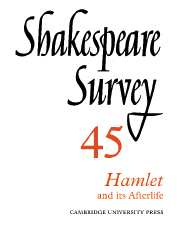Book contents
- Frontmatter
- The Reception of Hamlet
- ‘Hamlet, Revenge!’: The Uses and Abuses of Historical Criticism
- Revision by Excision: Rewriting Gertrude
- Gazing at Hamlet, or the Danish Cabaret
- ‘He’s Going to his Mother’s Closet’: Hamlet and Gertrude on Screen
- Shakespeare Rewound
- Freud’s Hamlet
- ‘Pray you, undo this button’: Implications of ‘Un-’ in King Lear
- Marx and Shakespeare
- Peter Street, 1553–1609: Builder of Playhouses
- Shakespeare Performances in England 1990–1
- Professional Shakespeare Productions in the British Isles, January–December 1990
- 1 Critical Studies
- 2 Shakespeare’s Life, Times, and Stage
- 3 Editions and Textual Studies
- Books Received
- Index
2 - Shakespeare’s Life, Times, and Stage
Published online by Cambridge University Press: 28 March 2007
- Frontmatter
- The Reception of Hamlet
- ‘Hamlet, Revenge!’: The Uses and Abuses of Historical Criticism
- Revision by Excision: Rewriting Gertrude
- Gazing at Hamlet, or the Danish Cabaret
- ‘He’s Going to his Mother’s Closet’: Hamlet and Gertrude on Screen
- Shakespeare Rewound
- Freud’s Hamlet
- ‘Pray you, undo this button’: Implications of ‘Un-’ in King Lear
- Marx and Shakespeare
- Peter Street, 1553–1609: Builder of Playhouses
- Shakespeare Performances in England 1990–1
- Professional Shakespeare Productions in the British Isles, January–December 1990
- 1 Critical Studies
- 2 Shakespeare’s Life, Times, and Stage
- 3 Editions and Textual Studies
- Books Received
- Index
Summary
It is a courageous scholar who publishes a book with the professed aim of adding to the sum of human ignorance; but in Shakespeare studies we need such books. If the first age of the discipline saw figures like Fleay, Chambers, and Greg create a model of English Renaissance drama that was part scholarship, part hypothesis and guesswork, the second was an age of credulity, of critics in awe of dead giants whose authority lived on. As we enter the third age, the old certainties topple, and we aim for a state, to misquote John Ford’s Friar Bonaventure, of knowledge in ignorance. One of the books helping us on our way is Margreta de Grazia’s subtle and persuasive analysis of the birth of Shakespeare scholarship, Shakespeare Verbatim (Oxford, 1991).
The giant whom de Grazia has set out to bury goes back further than most: Edmond Malone, arguably Shakespeare's first truly scholarly commentator, whose assumptions, aims, and methodology remain the foundation of modern Shakespeare studies. De Grazia shakes those foundations:
To recognize the synthetic and contingent nature of the Shakespearean apparatus is to allow for the possibility of its being otherwise. Once the apparatus is situated in relation to historical exigency, its conceptual grip begins to weaken.
(p. 13)- Type
- Chapter
- Information
- Shakespeare Survey , pp. 175 - 192Publisher: Cambridge University PressPrint publication year: 1992

